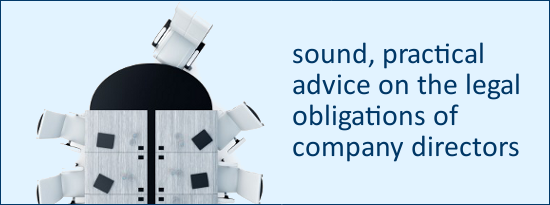The duties of company directors
Once appointed a company director becomes subject to various duties which determine how they may or may not act. The duties are intended to protect the company and hold directors to account. Breach of duty will lead to a director incurring liability and action may be taken by the company (and in limited circumstances by shareholders of the company in a derivative action). Compliance with the duties must therefore be taken very seriously.
Prior to the Companies Act 2006, the duties were set out in case law which derived from the principle that directors are fiduciaries of the company and owe it fiduciary duties. These included duties to exercise skill and care and duties to act in good faith and the interest of the company.
The duties have since been codified by the Companies Act 2006 and are:
- Duty to act within their powers
- Duty to promote the success of the company
- Duty to exercise independent judgment
- Duty to exercise reasonable care, skill and diligence
- Duty to avoid conflicts of interest
- Duty not to accept benefits from third parties
- Duty to declare interests
More than one of the duties may apply in a given situation and it is therefore vital that steps are taken to ensure compliance with all of them. The remedies that are available to a company for breach of the duties include:
- Payment of compensation by the director
- Account of profits from the director
- Return of company property
- Rescission of a contract
- Injunction against the director
These remedies are intended to ensure that the proceeds of breach of duty are returned to the company. Failure of a director to declare interests is also a criminal offence punishable by a fine.
Board level responsibility
Directors must ensure that they are kept informed on a regular basis of the company’s health and safety risks and performance. To achieve this, companies may choose to appoint a health and safety director, or allocate health and safety responsibilities to a senior manager, an existing director, the chief executive or a specially formed health and safety committee. The appointed individual (or committee) should be charged with keeping the board regularly informed of health and safety matters.
However, companies must remember that responsibility for health and safety does not stop with a health and safety director or committee. A collective effort is required to manage the health and safety of a company and will assist in complying with laws and regulations.
Proper procedures
Good risk assessment and auditing procedures are required by law and make commercial sense. The HSE has published a Guide on measuring health and safety performance. The British Standards Institute has developed OHSAS 18001, which is a specification assessment for Occupational Health and Safety Management, in order to help companies meet health and safety obligations more efficiently. BSI published OHSAS 18002 to explain the requirements of the specification and to provide guidance as to its implementation.
Health and Safety at Work etc Act 1974
The Health and Safety at Work etc Act 1974 (HSWA 1974) sets out the basic health and safety duties of a company, its directors, managers and employees. It also acts as the framework for other health and safety regulations, including the Management of Health and Safety at Work Regulations 1999 (the Regulations).
The range of legal obligations placed on employers with respect to health and safety is extensive. The particular obligations which apply in any given case will depend on the activities carried out by the company, the extent of the risks posed by these activities and other factors such as the number of employees. The main obligations imposed by the HSWA 1974 and the Regulations include the following:
- Employers are responsible for ensuring the health and safety of their employees and those that are affected by their activities so far as reasonably practicable (sections 2 and 3, HSWA 1974).
- An employer must assess and review the work-related risks faced by its employees and by others affected by the company’s activities. This risk assessment must be “sufficient and suitable” (regulation 3, the Regulations).
- An employer must make and give effect to appropriate arrangements for the effective planning, organisation, control, monitoring and review of the preventive and protective measures (regulation 5, the Regulations).
- An employer must audit the adequacy of these procedures (regulation 3, the Regulations).
- One or more competent persons must be appointed to implement the measures needed to comply with health and safety law (regulation 7, the Regulations).
- An employer must provide its employees with understandable and relevant information and training on the risks they face and the preventive and protective measures to control those risks (regulations 10 and 13 of the Regulations and the Health and Safety (Consultation with Employees) Regulations 1996).
Employers with over 5 employees must also:
- Produce a written health and safety policy.
- Describe the arrangements for putting the policy into practice.
- Bring the policy and any revision of it to the attention of employees.
- Revise the policy whenever appropriate (section 2 and section 3, HSWA 1974; regulation 2, Employers’ Health and Safety Policy Statements (Exception) Regulations 1975).
- Record appropriate arrangements for the effective planning, organisation, control, monitoring and review of the preventive and protective measures (regulation 5, the Regulations); and
- Record the significant findings of risk assessments and any group of employees identified by it as especially at risk (regulation 3, the Regulations).
A breach of any of these statutory obligations will constitute a criminal offence by the company, leaving it open to a range of sanctions.
Individual liability
An individual director, company secretary or manager of a company can be held criminally responsible for health and safety offences (section 37, HSWA 1974) where:
- The company itself is found guilty of a health and safety offence.
- The offence was committed with the consent or connivance of, or was attributable to any neglect on the part of, the director or manager.
Consent means knowledge and awareness of the circumstances and the risks which caused the health and safety failure. Connivance means knowing and not doing anything about the risks. Neglect means unreasonable breaching of a duty of care.
In addition, a director convicted of a breach of section 37 of the HSWA 1974 can be disqualified from being a director for up to 15 years (section 2(1), Company Directors Disqualification Act 1986).
Companies can purchase insurance to protect directors (section 233, Companies Act 2006). However, protection can only be obtained for the cost of civil damages and for the legal costs in defending proceedings, and not for criminal fines or penalties.
Common law manslaughter
An individual commits manslaughter when he causes a death through gross negligence. The jury must be satisfied that:
- The defendant owed a duty of care to the deceased.
- There had been a breach of this duty of care.
- The breach was so grossly negligent that the defendant can be deemed to have had such disregard for the life of the deceased that the defendant’s conduct should be seen as criminal and deserving of punishment.
A person need not be aware of the risks created by their conduct for that person to be convicted of manslaughter. However, a defendant who is reckless might be more likely to be found grossly negligent.
Corporate Manslaughter and Corporate Homicide Act 2007
The Corporate Manslaughter and Corporate Homicide Act 2007 came into force on 6 April 2008 and applies to the whole of the UK. The aim of the Act was to make it easier to convict companies and individual directors or officers of manslaughter.
The Act introduced a new offence of corporate manslaughter (known as corporate homicide in Scotland) which applies to all organisations operating in the UK. Originally, two new offences for individual directors and officers of reckless killing and killing by gross carelessness were contemplated. However, the Act does not include provisions imposing individual liability for directors and managers. The common law offence of manslaughter by gross negligence continues to apply to individuals.
The Act lifts Crown immunity to prosecution so that bodies such as Government departments are liable to prosecution.
Insurance
As under section 309A(5) of the Companies Act 1985 Section 233 permits a company to purchase insurance for its directors, and those of an associated company, against any liability attaching to them in connection with any negligence, default, breach of duty or breach of trust by them in relation to the company of which they are a director.
Wrongful trading
On the application of a liquidator, the court may require a contribution to the assets of a company from a person who is or was a director of the company where the company has gone into insolvent liquidation and at some point before the commencement of the winding up of the company, that person knew or ought to have concluded that there was no reasonable prospect that the company would avoid going into such insolvent liquidation and that person was a director of the company at that time. This is known as wrongful trading.
Disqualification of directors
Under the Company Directors Disqualification Act 1986 the court has a discretion (and in respect of unfit directors of an insolvent company a duty) to make a disqualification order against a company director which means that:
- he shall not be a director of a company, act as receiver of a company’s property or in any way, whether directly or indirectly, be concerned or take part in the promotion, formation or management of a company unless (in each case) he has the leave of the court, and
- he shall not act as an insolvency practitioner.
The minimum (if any) and maximum periods of director disqualification vary according to the basis of the disqualification order but broadly the length can range from 2 to 15 years. Factors such as previous conduct and seriousness of the current conduct of the director will be taken into account in deciding the length of any disqualification order. Failure by a director to comply with a disqualification order is a serious criminal offence carrying a maximum prison sentence of 2 years and/or a fine. Leave to act as a director during a period of disqualification may be granted by the court if it is satisfied that there is a need to grant leave to that director and that if leave is granted the public will remain adequately protected.
The grounds on which a disqualification order might be made against a director are:
- Disqualification for conviction of a criminal offence (s. 2 & s. 5 CDDA 1986)
- Disqualification for persistent breaches of company law including directors’ duties (s. 3 CDDA 1986)
- Disqualification for fraud, etc. in the winding up of a company (s. 4 CDDA 1986)
- Disqualification of an unfit director of an insolvent company (s. 6 CDDA 1986)
- Disqualification following an investigation of the company (s. 8 CDDA 1986)
- Disqualification for breaches of competition law (s. 9 CDDA 1986)
- Disqualification for participation in wrongful trading (s. 10 CDDA 1986)In addition to these statutory grounds it is common for the articles of association of a company to provide for situations in which a director is automatically disqualified from continuing to act as a director of that particular company, such as his or her bankruptcy.
Solicitors here advise commercial concerns of all sizes on their corporate or partnership structure, on start-ups and reorganisations, on acquisitions, disposals and closure. The firm advises on:
- company law and director compliance
- shareholder arrangements
- new ventures and joint ventures
- buy-ins and buy-outs
- share and asset sales and purchases
- finance documents.






